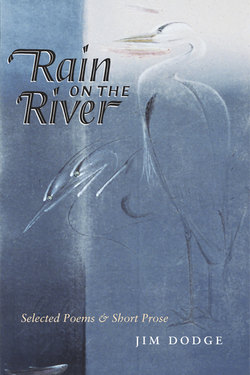Читать книгу Rain On The River - Jim Dodge - Страница 5
На сайте Литреса книга снята с продажи.
Notes and Acknowledgments
ОглавлениеWith few exceptions, the selected work in this volume appeared in limited edition letterpress broadsides, cards, and chapbooks published by Jerry Reddan’s Tangram Press in Berkeley, California, who also designed this volume. I’ve worked almost exclusively with Jerry for two decades, always with a sense of privilege, delight, and gratitude.
The first group of poems in this book, from “Learning to Talk” through “Bathing Joe,” constitutes annual Winter Solstice cards mailed to friends and colleagues, and also includes a few broadsides and occasional verse.
The poems from “Mahogany China” through “A Firmer Grasp of the Obvious” are selected from Palms to the Moon, a loose group of love poems published in 1987 in an edition limited to 100 copies and given away to friends and fellow practitioners.
Bait & Ice, a small gathering of poems on fishing, philosophy, and nature, was released in 1991 in an edition of 175, and includes the poems from “The Work of Art” through “Fishing Devil’s Hole at the Peak of Spring.”
The final chapbook from which work for this volume was drawn (“Getting After It” through “Death and Dying”) is Piss-Fir Willie Poems, a suite of persona poems offered as an homage to the vernacular of Pacific northcoast working people, particularly loggers, restoration workers, commercial fishers, ranchers, and those, like my father, in the building trades. I tried to capture the idiom–the diction, cadence, phrasing–as well as that combination of aesthetics, attitude, and turn-of-mind that constitutes cultural style. To my sense of it, I was successful enough that I can’t honestly claim the poems as my own. Whatever virtues of language, wit, or wisdom the reader might find, praise should accrue to the speakers from whom I borrowed; any liabilities, alas, are likely mine. Piss-Fir Willie Poems was published by Tangram in 1998 in an edition of 200 copies.
Before 1980, I also published two other chapbooks– da Vaca in a Vanishing Geography and (with Robert Funt) Sollla Sollew–but because these Mad River Press productions were published anonymously and pointedly anti-copyright, I haven’t included that work.
New poems, written or substantially revised in the past decade, make up roughly the second half of this volume.
A few of the new and selected works have appeared in other books and journals:
A version of “Green Side Up” was first published in Dalmo’ma VI: Working the Woods, Working the Sea (Empty Bowl, 1986) under the title “Treeplanting in the Rain.” The poem, under the latter title, was also published in Paperwork (Harbour 1991) and Propriety and Possibilities (Harrish Press, 1996).
“Aweigh” appeared in From the Island’s Edge: A Sitka Reader (Graywolf Press, 1995) and Northcoast View.
“Unnatural Selections: A Meditation upon Witnessing a Bullfrog Fucking a Rock,” “The Banker,” and “Mahogany China” were published in Terra Nova (Volume 3, Number 4, Fall 1998).
“Hard Work” appeared in Forest News (Winter 1999).
“Learning to Talk” and “Bathing Joe” appeared in Wild Duck Review, Casey Walker’s excellent journal of literature, necessary mischief, and news.
All books are more than the writer’s words, and in that spirit I’d like to acknowledge Jerry Reddan for his design of this volume; Pete Stoelzl for his impeccable typesetting; Christopher Stinehour’s calligraphic designs; and Shannon Dixon at Proof Positive for his work in helping create the cover. The cover art is the second panel of a triptych from my mentor and friend Morris Graves’ The Great Blue Heron and the Great Rainbow Trout Yogi in Phenomenal Space, Mental Space and the Space of Consciousness (tempera on paper, 1979), used with the kind permissions of Morris’ archive executor Robert Yarber and the Humboldt Arts Council. I also wish to thank the production directors at Grove/Atlantic and Canongate Books, Muriel Jorgensen and Caroline Gorham respectively, as well as the copy editors and art directors involved.
Three bows to Gary Snyder for his usual tough reading of the manuscript and his suggestion for the title.
I also offer special thanks to my editors, Morgan Entrekin at Grove/Atlantic and Jamie Byng of Canongate for their steadfast support of my literary work.
Melanie Jackson, my agent, deserves particular mention for her unstinting efforts and merciful acumen on my behalf.
Finally, my deepest gratitude to family and friends for their unflagging faith, encouragement, and forbearance.
